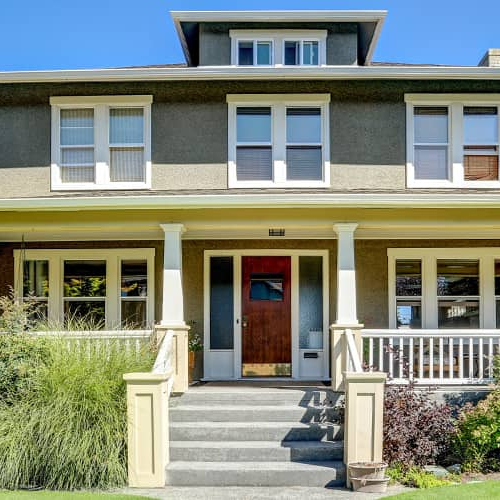10 tips to help you afford a 15-year mortgage
Feb 25, 2024
•6-minute read
Deciding what length of mortgage to choose when you’re buying a home is an impactful financial decision. While 30-year mortgages often make the most sense (about 90% of home buyers choose that option), some home buyers opt for a shorter 15-year mortgage in order to pay the debt off more quickly.
A 15-year mortgage has other benefits as well. Lenders usually offer a lower interest rate on 15-year mortgages. Since you’re paying the loan off in half the time, you’ll pay significantly less in interest throughout the life of the loan than you would with a 30-year mortgage.
Another benefit of the 15-year mortgage is you build up equity faster since you’re paying at an accelerated pace. Plus, although you’re paying more monthly, you’ll enjoy the freedom of living in a paid-for house much sooner.
Top tips for how to afford a 15-year mortgage
How can you be sure you can afford the higher monthly payments on a 15-year mortgage? Here are a few tips to help you determine if a 15-year mortgage fits your budget – and to help you stay on track financially as you pay it down.
1. Make sure you understand the costs of a 15 year vs. 30 year loan
When calculating your home expenses, do a complete comparison of your 15-year and 30-year mortgage options. Be sure to figure in the interest rate you’ll pay with each since 15-year mortgages typically have a lower rate.
Look at your monthly payments as well as the total cost of your home with both types of mortgages. See how much you’d save in interest with a shorter loan period, then weigh the long-term benefit against the short-term pain of higher monthly payments.
The last thing you want to do is strain your monthly budget by taking on a higher mortgage payment.
2. Build up your emergency fund
Even if you’re in great shape with steady income now, that doesn’t mean you won’t ever face a job loss or an expensive medical event. An emergency fund protects you in the event of financial hardship and helps ensure that you’re still able to pay your mortgage and regular expenses on time.
Before taking on any type of mortgage, especially a 15-year loan, be sure you’ve saved up a robust emergency fund. Ideally, you’ll want to keep enough money in an emergency fund to cover 3 – 6 months’ worth of expenses.
When calculating your emergency fund needs, look at your budget and your monthly bills. Omit any expenses that are true luxuries (in other words, things you’re not obligated to keep paying for in an emergency). Keep all fixed costs like car payments, and include estimates of your variable expenses like utilities and food. Figure out what your mortgage payment will be on a 15-year term and be sure your emergency fund will cover it in case you lose your job or face another unexpected situation.
3. Choose a reasonably priced home
Deciding whether or not to take out a 15-year mortgage also depends on the home you choose to purchase. Since your monthly payments will be higher than with a 30-year mortgage, going the 15-year route will likely require you to lower the total amount of mortgage debt you’re willing to take on.
A 15-year mortgage can be to your benefit if it helps you to curb your excitement and purchase a more affordable home. It can also force you to prioritize paying off your home more swiftly.
By buying a house that you can afford on a 15-year repayment schedule, you lower your risk of buying an extravagant house and becoming “house poor.”
4. Increase your cash flow
Your cash flow is the amount of money you bring in each month. If your cash flow is small or tight based on your current expenses, affording a 15-year mortgage may not be possible as is.
The best thing you can do is increase your cash flow. There are a few ways you can do this, which include:
- Looking for a higher paying job
- Taking on a second job
- Establishing a side-hustle or freelance gig
- Getting started with investing
Even a slight increase in your personal cash flow can make a 15-year loan’s higher monthly payments easier to bear.
5. Lower your debt-toincome ratio
Debt is another factor impacting your cash flow. Lenders examine your debt-to-income ratio before granting you a home loan because they need to make an educated guess as to how capable you will be of making payments on time and in full for many years. In many cases, a 43% debt-to-income ratio is the highest benchmark a borrower can have and still receive a qualified mortgage.
The lower your debt-to-income ratio, the better equipped you will be to make consistent monthly payments. Consider your total debt before committing to a 15-year mortgage, because the less debt you have, the better your cash flow situation.
In addition to your debt, think about future big expenses you may face. If you have children heading to college or are planning weddings, you may want to take those costs into account when buying a home. Even though you can’t predict every expense you’ll face over the next 15 years, make some educated guesses. If you foresee a lot of expensive events in the future, those will impact your cash flow and your ability to pay your mortgage.
It’s important to leave some space in your budget for spending more than you expect. This doesn’t just apply to major expenses like medical emergencies, but also to the small expenses that tend to add up. Don’t take on a mortgage that leaves you zero wiggle room in your budget.
6. Consider your long-term goals
Regardless of the price of your home, a 15-year loan will have higher monthly payments. Those monthly payments help you build equity in your home faster but you risk making it harder to cover those surprise expenses when they pop up.
Before you decide on a 15-year loan, think about your long-term goals. If you’re trying to build equity in your home faster or want to own your home outright sooner, finding ways to budget for those higher monthly payments makes sense.
However, if you’re just trying to get into a home and want the lowest possible payment or plan on selling your home in the near future, a 30-year or an adjustable rate mortgage (ARM) may be a better choice.
7. Track your monthly spending
If you’re determined to take out a 15-year home loan, you’ll want to make sure you have enough money every month to afford the payments without stretching your budget. The easiest way to do that is to find ways to free up cash each month.
Take a look at the things you spend money on each month. This may include things like:
- Subscriptions
- Eating out
- Streaming services
- Entertainment
- Car insurance
- Utilities
- Phone bills
- Rent or mortgage payments
Once you have an idea of where your money is going, you can start looking for ways to lower your costs. Cancel unused subscriptions and streaming services. Downgrade your cable package and try to eat out less often. Talk to your insurance provider to see if you can lower your monthly premiums. The more money you can free up, the easier it will be to afford a 15-year mortgage.
8. Improve your credit score
Lenders reward borrowers with higher credit scores by offering them lower interest rates. The lower your interest rate is, the smaller your monthly mortgage payment will be. If you can, start looking for ways to improve your credit before you apply for a 15-year loan.
Make sure you’re paying your bills on time each month. If you carry a balance on your credit cards, work out a plan to make more than the minimum payment as often as possible. Pay off existing debts aggressively and avoid applying for new loans before you apply for your new mortgage or refinance.
Over time, your credit score should go up, making it easier for you to qualify for a 15-year mortgage in the first place. The better your credit score is, the more affordable your mortgage payment will be.
9. Make a larger down payment
The size of your mortgage payment largely depends on the amount of money you borrow. The more you borrow, the larger your monthly mortgage payment will be. Luckily, there’s a way to lower how much money your lender has to give you on your mortgage loan: make a larger down payment.
If you can, make a down payment of at least 20% of the home’s purchase price. This will decrease the amount you have to borrow, thereby saving you money on your mortgage.
10. Pay your closing costs upfront
Every loan has closing costs. While you can typically roll those costs into your loan, it will increase the amount that you’re borrowing from your lender. This can make your monthly payments more expensive for the life of the loan.
Rather than rolling the closing costs into your loan, try to pay them upfront. You’ll end up having to pay cash at closing, but you’ll save yourself from having to pay interest on the closing costs for the full 15-year loan term.
The bottom line
A 15-year mortgage isn’t the best choice for everyone, but these tips can help you make an informed decision. You could save thousands of dollars in interest payments by choosing a 15-year mortgage, as long as you approach it with planning and diligence.
If you’re ready to buy a house or want to refinance your 30-year loan into a 15-year mortgage, start the approval process today.

Miranda Crace
Miranda Crace is a Senior Section Editor for the Rocket Companies, bringing a wealth of knowledge about mortgages, personal finance, real estate, and personal loans for over 10 years. Miranda is dedicated to advancing financial literacy and empowering individuals to achieve their financial and homeownership goals. She graduated from Wayne State University where she studied PR Writing, Film Production, and Film Editing. Her creative talents shine through her contributions to the popular video series "Home Lore" and "The Red Desk," which were nominated for the prestigious Shorty Awards. In her spare time, Miranda enjoys traveling, actively engages in the entrepreneurial community, and savors a perfectly brewed cup of coffee.
Related resources

10-minute read
How much house can you afford?
Ever asked, “How much house can I afford?” Determine how much you can spend on a mortgage with help from the Rocket Mortgage home affordability calc...
Read more

10-minute read
9 tips for getting the best mortgage rate
There are many ways to secure a great mortgage rate, even with ongoing market volatility. Here are 9 ways to get the best mortgage rates available to you.
Read more

8-minute read
Average closing costs in Vermont
Read more